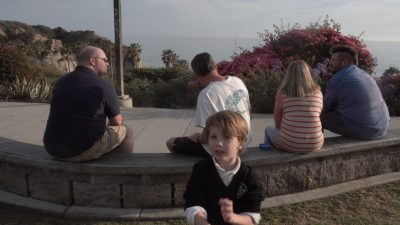Background

The men of APACHE BLUES: Welcome Home with the directors on Veterans Day
There is a saying in documentary filmmaking, “If, at the end of your project, you have the same film you set out thinking you were going to make, you didn’t do your job.” That is because you need to allow the story to reveal itself as the interviews progress. If you don’t, all you’ve made is an opinion piece. You thought you knew what the story was, and you went out and found the pieces that fit what you were thinking. After four years of work, over 100 hours of interviews, a sea of interchangeable hotel rooms and probably more than a few too many gas station danishes, we can say that we do not have the movie we thought we were setting out to make.
As two men born after the Vietnam War, we started this film thinking we were exploring the societal factors that have led to Vietnam veterans being pushed into the background and not being as welcomed and held in high esteem like veterans of other wars. From the way they are depicted in film, to the old media reports we would watch, and the stories we read in the history books, the Vietnam War “narrative” did not match what we learned whenever we talked to Vietnam veterans in our own lives. We wanted to know not only where and why that disconnect was still happening almost fifty years later, but also what could we do to repair it.
Production
Not ones to leave a question unanswered, we hit the road to talk with Vietnam veterans ourselves. A lot of roads actually. 23,000 miles worth of roads and counting. One thing became quickly apparent to us. Many of these men had never spoken of the war in the 47 years since they returned home but the emotion in these interviews was just as raw as if it had happened to them yesterday. When the cameras turned off, it was as if a weight was lifted from their shoulders and they thanked us for being the first to sit down and listen to their stories.The power of being able to speak freely about their experiences was undeniable.
It’s one thing to notice behaviors during the discussion, however, it’s another to see if the observation was true beyond that day. Over the years, we have followed up to observe if there were any changes in their lives after their first discussions with us. The results are dramatic. They have begun dialogues with their families and co-workers. They have fewer bad dreams and their families say they are laughing and joking more than ever before.
This is where our story changed. This is not a journey of self discovery for us. It is a journey of self discovery for these veterans. This story is not just for these men though. It is a story for all veterans of all conflicts. The experiences and affects of war have been universal for soldiers across history and cultures. The affects that talking about their experiences has had on these men is profound. Hopefully it will inspire not only more veterans to talk about their experiences, but also more friends and family members to want to open to hearing those stories.
Current Status
We have a completed edit of the movie. We are extremely proud of this film and actually thought we were done, but… we received some incredible advice that completely changed our world view. We were told that the film is good enough right now, that we could sell it and get it on television. People would watch it and say, “Wow, what a great movie” and then they would get on with their lives. Or, we can take the time to complete some more filming so we can open the message up in a way that sticks with the audience and inspire them to go out and talk with the veterans in their lives, potentially having a tremendous impact on countless people.
We chose the second option. So, with the help of our veterans, we will be hitting the road and driving around America one more time in the Summer of 2020. The purpose of this trip is twofold. Our veterans want to pay it forward and speak with modern day veterans in an attempt to “give them a fifty year head start” and healing after war and impressing upon them the value of speaking with others about their experiences. We also hope to impress upon friends, family members, co-workers, etc… the importance of listening to the veterans in their lives. It is such a simple task, and something we are all capable of doing.

With RB Alexander in San Clemente, CA
